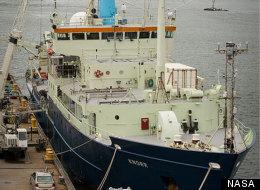The study will be completed over a three week period and will travel around the North Atlantic Ocean. The study will take place aboard the Woods Hole Oceanographic Institution's (WHOI) ship, 'Knorr'. The researchers "hope [that] research like this will offer insight on the dynamics behind the dramatic changes in the ocean's salt content."
There has been a significant increase in salinity in the world's oceans over the past 50 years. Computer programs run in order to predict weather and climate changes have not accurately predicted the severe increase in salinity that has occurred these past 50 years. Scientist's believe global warming has resulted in "an increase in evaporation". This increase in evaporation results in the salt (and other substances of the oceans) being left behind, which increases the salinity of the remaining water. Not only is evaporation a possible cause for the salinity changes but, "such factors as winds can also contribute".
Data will be collected using the WHOI's advanced technology, including "a variety of drifting, remotely operated and moored sensors."Data from satellites will also be collected in order to compare temperature and salinity.

"The Woods Hole Oceanographic Institution's research vessel Knorr docked before its scheduled departure on Sept. 6 to study salinity in the mid-Atlantic ocean."
Original Article: http://www.huffingtonpost.com/2012/09/10/ocean-salinity-nasa_n_1871011.html?utm_hp_ref=green
